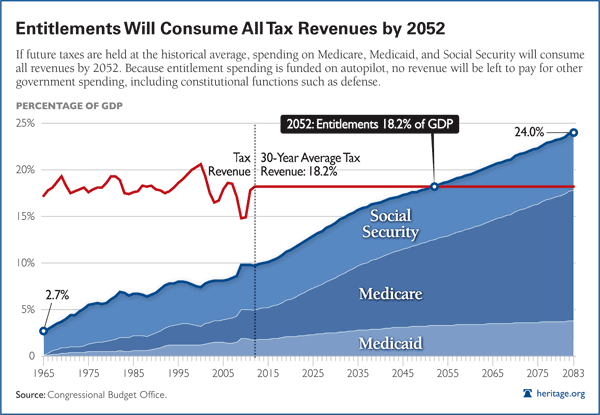THE ISSUE:
Entitlements—Social Security, Medicare, and Medicaid—threaten to bankrupt the nation. The unsustainable tsunami of spending on these programs will accelerate as 77 million baby boomers flood into them. Unlike other parts of the federal budget, such as defense or most education programs, Congress does not review and approve the level of funding for these programs annually or…ever. Rather, their expansion is on autopilot, fueled by demographic changes and rapidly rising health care costs. We are reaching a budgetary tipping point as entitlement spending’s automatic “first call” crowds out other national priorities. Recent studies show that America’s long-term fiscal situation is one of the world’s worst, which makes reforms even more urgent if we are to avoid the fate of Greece or even Britain. But entitlements are also a moral challenge. It is simply wrong to make unsustainable promises to today’s adults by shackling our children and grandchildren with crippling debt or heavy taxes.
- Ever-Higher Spending. Without reforms, these programs will more than double the historical average of federal spending from 20% of the economy to nearly 50% in just two generations.
- Lack of Budget Control. The United States is the only major country that does not subject these programs to real budgets and budget control.
- Doubling Taxes. Raising taxes to pay for these uncontrolled promises is not an option. Congress would have to double federal Income tax rates on the next generation and continue to raise taxes in a futile attempt to keep up with spending.
- New Revenue, New Spending. Even if higher taxes were thought to be part of the solution, the experience of Obamacare and previous programs demonstrates that new revenue simply encourages new spending.
- Mortgaging Our Future. U.S. debt exceeds $13 trillion, but we would have to take out the equivalent of a mortgage of $63 trillion to cover the future debt costs of these entitlements. Each person’s share of that hidden mortgage now exceeds $200,000.
- Tell Us the Truth and Fix the Way Congress Spends Our Money. First and foremost, the age of entitlements must end. Rather than allow these programs to bankrupt us on autopilot, Congress should set firm and enforceable budget caps for Medicare, Medicaid, and Social Security. Put these programs on a firm, long-term budget—say 30 years—and require Congress to review these budgets regularly. Triggers or other mechanisms should be deployed to enforce budget limits if Congress fails to act. Entitlement obligations should be disclosed prominently in the annual budget resolution. Before enacting major new policy changes, Congress should show their true costs by considering the long-term budgetary implications. Today, Congress looks only at the first 10 years. When lawmakers do pass reforms, savings should be banked rather than spent on other programs.
- Fix Medicare. Establish a new Medicare “defined contribution” system as we transition away from today’s costly and inefficient fee-for-service system. This means deciding as a nation how much we want to spend instead of today’s open-ended promises. New retirees, just like federal workers, would receive a government contribution to purchase the health insurance that best meets their needs. The contribution, or “premium assistance,” would be capped but reviewed periodically. An individual’s contribution would be adjusted according to income and underlying medical condition.
- Fix Medicaid. The current system is unaffordable, imposes huge costs and unfunded mandates on states, and is poorly suited to the needs of patients or doctors. Healthier families should be allowed into private health insurance with their share of Medicaid money. We need patient-centered care to give the disabled, elderly, and their families a say in the care and services they receive. Medicaid’s long-term care benefit must be transformed from an open-ended entitlement to an insurance-based model of private coverage as part of a general strategy to boost long-term care insurance.
- Fix Social Security. To boost savings, we need to include a system of voluntary personal accounts within Social Security. The system as a whole should be made solvent by transforming the remainder of Social Security to “real insurance,” focusing benefits on those who really need them during retirement while strengthening the safety net for poorer retirees. As Americans live longer productive lives, the retirement age should be raised and indexed to future increases in longevity. Incentives such as removing payroll taxes for workers over the retirement age should accompany these changes. Another important step is to improve the indexation of past earnings used to calculate Social Security benefits and establishing a more realistic cost-of-living adjustment that better reflects changes in a retiree’s cost of living.
- Increase Retirement Savings. Automatic enrollment, whereby workers are automatically enrolled in employer-sponsored retirement savings but allowed to opt out, should be expanded, and automatic IRA, a simple payroll deduction system that small businesses would offer to employees, should be created. Workers should be encouraged to include annuity-like products, which ensure that they will not outlive their savings, in their retirement plans.
------------------
SUPPORTING DOCUMENTS:
- Truth and Fix - Taking Back Our Fiscal Future
- Fix Medicare - How to Fix Medicare: A New Vision for a Better Program
- Fix Medicaid - A Road Map for Medicaid Reform
- Fix Medicaid - How States Can Survive the Medicaid Crisis
- Fix Social Security - How to Fix Social Security
- Fix Social Security - Time to Raise Social Security's Retirement Age (2010)
- Increase Retirement Savings - Increasing Retirement Security Through Automatic IRAs

